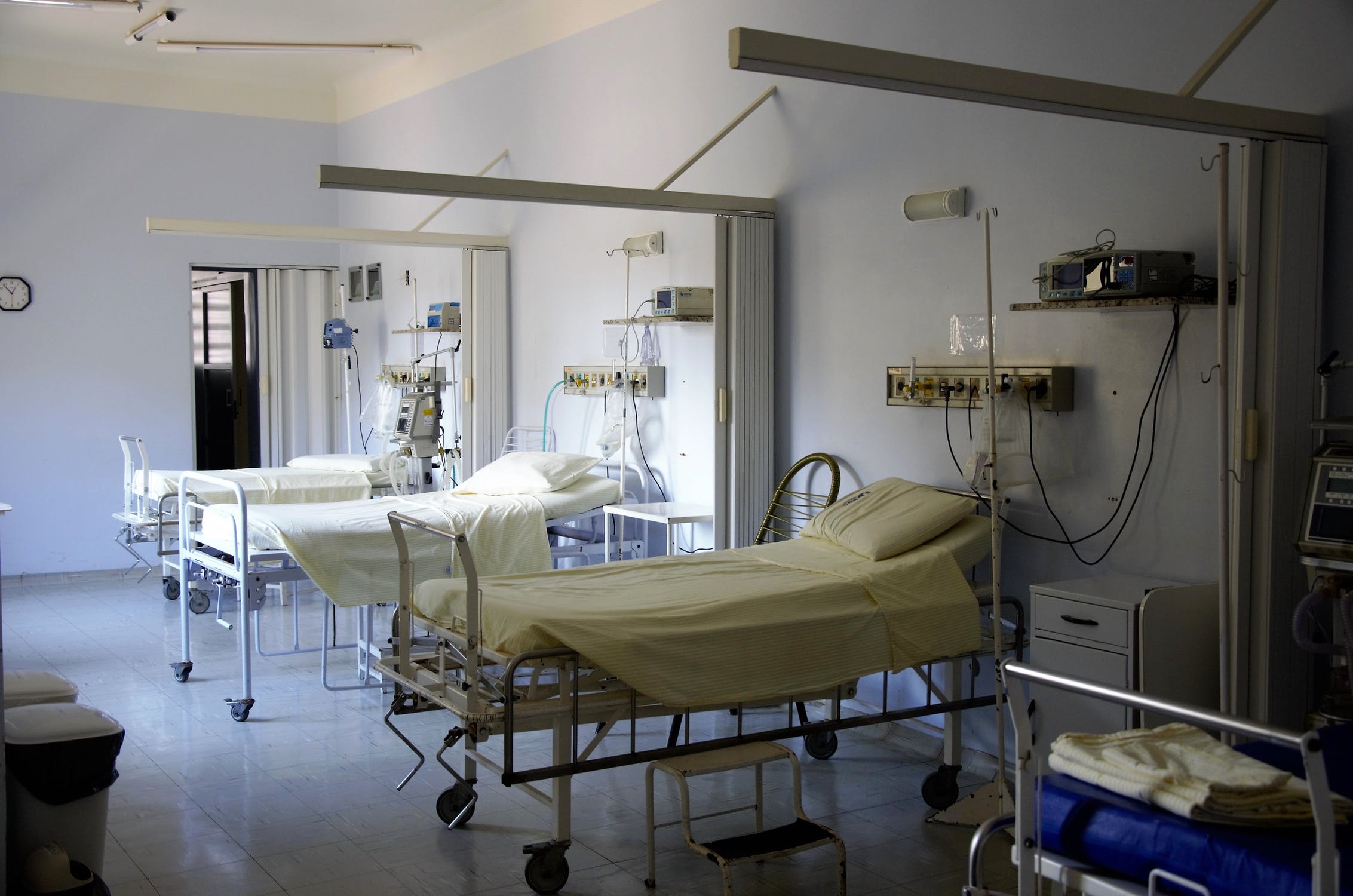Why I’m Passionate About Question 1
You Should Be Too
 Election Day is around the corner, and many of you are still undecided about what is arguably the most well-known and heated topic of this year’s election: Question One. Many voters feel as though this question is best left to be decided by those who work in healthcare, but when the professionals involved are so very divided on the topic, the general public becomes key in the decision to be made. I’m not a nurse and I have no professional knowledge of the medical field, but this question still resonates with me for a couple of different poignant reasons.
Election Day is around the corner, and many of you are still undecided about what is arguably the most well-known and heated topic of this year’s election: Question One. Many voters feel as though this question is best left to be decided by those who work in healthcare, but when the professionals involved are so very divided on the topic, the general public becomes key in the decision to be made. I’m not a nurse and I have no professional knowledge of the medical field, but this question still resonates with me for a couple of different poignant reasons.
I may not be a nurse, but I do know what it is like to be in a profession where you are repeatedly undervalued, underappreciated, and constantly expected to meet impossible demands, having been given the bare minimum to do so. It might have been once upon a time that nursing was just nursing, but today, nurse duties are limitless. I know what it’s like to go all day without eating or using the bathroom because you’re too busy to stop to take care of yourself. I know what it’s like to end your day covered in various fluids that are not your own after having been lambasted by your charge’s family members. I know what it’s like to have to fill the role of a psychologist, friend, mother, disciplinarian, advocate, and more. I know what it’s like to leave work each day hoping that I haven’t missed anything, that I’ve done enough for those in my care. I may not be a nurse, but I feel a palpable camaraderie with people, who like me, work tirelessly for those they care for each day. While no laws are currently being voted upon to make my job more feasible, I sure as heck want to have the backs of my brothers and sisters on the front lines of society’s care.
the front lines of society’s care.
I may not be a nurse, but I know what it is like to be a patient. I have been fortunate that my first hospital stay was this past year with the birth of my son. Until then, I really had no reference point or personal experience upon which to base an opinion of hospital care. Now I can say that there are severe deficiencies in the healthcare system. As a patient, I had mostly terrific nurses who deserve the utmost praise. However, I also experienced neglect, which I can only hope to attribute to the fact that the floor was most likely under-staffed and I was a less needy patient, therefore I was left to fend for myself. In my hour of need, I didn’t receive the care that I should have. Fortunately, in the grand scheme of things, it did not affect my health. Following that, though, I have a running list of errors that have been made that have caused harm to my immediate family. While it has taught me an important lesson in self-advocacy, something has to change to improve patient care.
This is why I feel so passionate about question one, and why I will be proud to vote “yes” on question one on November 6th.
There are a lot of reasons being thrown around as to why others are saying to vote no on the question, and I want to share with you why they lack validity.
 “I don’t want the government to control hospitals, so I’m voting no.”
“I don’t want the government to control hospitals, so I’m voting no.”
It seems to me that any time there is mention of the government getting involved in anything, people immediately are on the defensive. Propaganda from the “Vote No” campaign is misinforming so many people by using scare tactics about government involvement. The nurses I’ve spoken with agree that the government should not have to be involved on this topic, but they have been fighting for twenty years for change, to no avail. Nurses fought for contractual addendums to address safe patient limits, but hospitals continuously refuse to abide by these ratios. And who is going to stop them? Hospitals will not invest time or money to correct the issues regarding these ratios. Nurses who are currently working on the front lines are the ones who wrote this bill, nurses who experience the negative impact of heavy patient assignments daily. The only government involvement will be to set the patient ratios; they will have no other say or hand in what goes on.
What does setting ratios mean? It means that there will be a maximum number of patients per registered nurse, varying depending on the department. For example, postpartum care will be 6 patients per nurse. Maybe that will mean that, in the future, nurses who are dealing with fragile new mothers will be able to keep their patients straight, unlike what I experienced. There is a lot of talk about hospitals not being able to make decisions on their own because of these limits. The truth of the matter is that hospitals will be allowed to create lower ratios, but will not be allowed to go beyond the maximum. For example, if a Medical/Surgical floor has a limit of 4 patients per nurse, they cannot assign a nurse 5 patients. But if patients are in critical condition, hospitals are allowed to only assign a nurse 2 patients. It has been cited that nurses at Mass General are voting “no”. This is true because Mass General already has better ratios than most hospitals. Changing the ratios by law does not necessarily affect them, so they stand to gain nothing from it.
The way I see it, a lesser patient assignment per nurse means that nurses will be able to spend more time with each individual patient, thus improving their care.
 “Increased cost will cause small hospitals to close.”
“Increased cost will cause small hospitals to close.”
Again, fear tactics are being used to make people believe that they are going to lose their jobs. In reality, tens of millions of dollars have been spent on advertising for the “no” campaign, money that could have been spent on closing the so-called deficit that will be created by setting safe patient limits. The number one reason why hospitals are lobbying for a “no” vote is that they see patients as dollar signs, not human beings. Hospitals in Massachusetts net one billion dollars in profit annually. A study was conducted based on hospital financial reports and it showed that 54 Massachusetts hospitals would NOT have their profitability affected by the law. So, if there is such a concern about hospitals closing, why are they wasting so much money on ad campaigns? Why
Because it’s not a matter of not having the money to safely staff hospitals, it’s a matter of greed. Don’t be fooled by the scare tactics. You don’t see many “yes” campaign advertisements because they are funded by the MNA, which has limited funds at their disposal. Hospitals have plenty of money to spend because they refuse to spend it on improving staffing. In California, where safe patient limits were already put into effect, not a single hospital closed from 2004 to now as a direct result of the law. Profitability actually increased by 165% from 2004 to 2010. This only makes sense because if patients are receiving proper care, readmissions would be drastically reduced and fewer errors would be made, thus fewer hospital lawsuits as well.
“Voting yes would mean that ancillary staff would lose jobs.”
 The fear-mongering continues. If you take the time to read the law, this is a complete fallacy. Nurses, nurturers by nature, not only care for their patients, but also for their fellow staff. Upon writing this law, nurses included protections that would prevent hospitals from reducing ancillary staff. Hospitals CANNOT reduce service, maintenance, clerical or other professional staff in order to hire more nurses. Nurses consider healthcare to be a team sport and made sure that no one would suffer from the change.
The fear-mongering continues. If you take the time to read the law, this is a complete fallacy. Nurses, nurturers by nature, not only care for their patients, but also for their fellow staff. Upon writing this law, nurses included protections that would prevent hospitals from reducing ancillary staff. Hospitals CANNOT reduce service, maintenance, clerical or other professional staff in order to hire more nurses. Nurses consider healthcare to be a team sport and made sure that no one would suffer from the change.
“Hospitals will be fined for violations.”
You know what I love most about this one? Hospitals are already planning on not following suit. If they weren’t planning on breaking a law that went into effect, there would be no concern over violations. This further proves why we need this law because nurses cannot get hospitals to put patient safety first without it. However, hospitals actually do not automatically receive a fine. They are first investigated to determine the validity of the claim, and then the hospital would be informed of the decision one way or the other. Hey, hospitals here’s a hint. Worried about the money that would be spent investigating these claims? DON’T BREAK THE LAW.
“There will be a nursing shortage.”
 Did you know that approximately 3,000 nurses graduate from colleges in Massachusetts each year? Did you know that Massachusetts also has the most nurses out of any state working part-time or per-diem? This may in part be due to choice, but it is largely because of the mistreatment of nurses. Nursing has become a burnout job. When hospitals do not properly staff floors, nurses are in constant fear of losing their license because of errors made due to unsafe patient assignments. They also are overworked due to understaffing. Another reason that nurses are not working full-time is that full-time positions are often not a choice. Hospitals do not want to pay nurses’ benefits, so part-time positions are the only ones available. In short, nurses are available, but they want to be treated fairly.
Did you know that approximately 3,000 nurses graduate from colleges in Massachusetts each year? Did you know that Massachusetts also has the most nurses out of any state working part-time or per-diem? This may in part be due to choice, but it is largely because of the mistreatment of nurses. Nursing has become a burnout job. When hospitals do not properly staff floors, nurses are in constant fear of losing their license because of errors made due to unsafe patient assignments. They also are overworked due to understaffing. Another reason that nurses are not working full-time is that full-time positions are often not a choice. Hospitals do not want to pay nurses’ benefits, so part-time positions are the only ones available. In short, nurses are available, but they want to be treated fairly.
“Wait times will increase.”
I don’t know about you, but I’ve seen that when you go to a hospital, you’re already facing a pretty long wait time. Let’s not pretend like this problem doesn’t already exist. However, again, if you take the time to read the bill, patients CANNOT be turned away, and ambulances in Massachusetts CANNOT be diverted. Wait times would actually decrease because more nurses will mean care will be expedited. People who are voting no act like more patients are going to magically appear, meaning fewer beds and more people waiting in the hallway. Guess what? There is already an abundance of patients in hospitals, and many of them already spend time waiting in hallways BECAUSE THERE IS NOT ENOUGH STAFF TO CARE FOR THEM. The number of available beds isn’t going to double because of the law. The number of nurses to care for these patients, however, will increase. Common sense tells me that this will actually result in fewer patients in the hallways, and again, fewer readmissions due to proper care being given the first time.
“Doctors are voting ‘no’.”
Insert eye-roll here. All due respect to doctors, but everyone knows it is the nurses that run the hospitals. They spend the most time with patients because they are on the front-lines, they are in the trenches. Nurses KNOW their patients, while doctors flit in and out at will. Doctors stand to benefit nothing from the law, and they spend very little time with the patients they are assigned to. I trust the judgment of the nurses who sweat it out every day.
 I’m not a nurse, but I know that care in hospitals needs to improve, and I don’t necessarily mean just for patients. We need to vote “yes” on this law to protect ourselves and our nurses. They deserve better and so do we. While this bill may not be perfect, change never is, but it needs to start somewhere. Without voting this into law, nothing will ever change and both patients and nurses will continue to be at risk. Please take the time to read the law and visit the websites provided so that you can make an informed decision.
I’m not a nurse, but I know that care in hospitals needs to improve, and I don’t necessarily mean just for patients. We need to vote “yes” on this law to protect ourselves and our nurses. They deserve better and so do we. While this bill may not be perfect, change never is, but it needs to start somewhere. Without voting this into law, nothing will ever change and both patients and nurses will continue to be at risk. Please take the time to read the law and visit the websites provided so that you can make an informed decision.
And if this non-nurse didn’t convince you, take it from a nurse who lives the reality of unsafe patient assignment every working shift:
“More nurses equals safer staffing to adequately take care of you and your family. I’m 29 and have been a nurse for 6 years. I am already overtired, overworked, and burnt out. I work at the bedside tirelessly every day. Most days I don’t eat, drink, or use the bathroom in a 12-hour shift because I want to make sure I’m taking care of my patients to the best of my ability, even if that means not taking care of myself. That shouldn’t be the norm. When we are taking care of too many patients -and I speak from personal experience- nurses are physically and emotionally drained and just trying to make it to the end of their shifts without killing someone. Medication errors can be made and patients can be unintentionally harmed or ignored, just because nurses are asked to take care of too many patients. We don’t always have the time to make informed decisions, to monitor closely enough, to educate properly… the list goes on. All patients deserve safe, quality care. Many shifts when I have too many patients to care for, I know that no matter how hard I am working, my patients still aren’t getting the attention they deserve from me, because it is physically impossible. It’s not fair to them, and it’s also not fair to me. We provide better, more effective, focused care for you and your loved ones when we have an appropriate, safe patient assignment. Are you okay with being that one extra patient that your nurse isn’t able to adequately provide safe care to? I know I wouldn’t be, and so I vote YES on question 1!"
See the following resources for more information.
https://safepatientlimits.org/
https://www.facebook.com/SafePatientLimits/
https://www.sec.state.ma.us/ele/ele18/ballot_questions_18/ballot_questions18.htm






